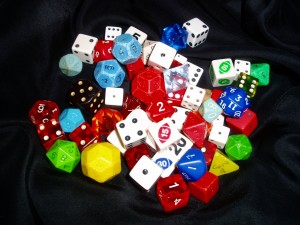 A guest post by Myke Cole
A guest post by Myke Cole
I’ve written a lot about the influence of gaming in my writing. I don’t have anything to say that you couldn’t guess (and that hasn’t already been said a hundred times at least): that gaming taught me to write a story on the fly with my audience trying to sabotage it. That it helped me to freely imagine, that it helped me understand a story inside the confines of a set of rules.
Not to mention connecting me to amazing people and equally amazing ideas, all of which are critical to the building the bedrock where a storyteller sets their roots.
But gaming had an unusually direct effect on my writing more recently. Back in February of this year, there was a minor blowup on the Internets when Games Workshop, the proprietors of the insanely popular Warhammer and Warhammer 40,000 universes claimed copyright over the term “Space Marine.” When the smoke cleared from that particular dustup, they were determined to be no richer for their efforts, serious in their attempts and greatly diminished in the eyes of the fan community.
Let’s just say I wasn’t surprised.
About a year earlier, I had finally developed contacts inside Black Library, the fiction wing of the Warhammer 40,000 universe and was in the middle of what turned out to be a year long process of hammering out ideas to start writing fiction for the franchise.
I was over the moon. I LOVE the Warhammer 40,000 universe. It is one of the most brilliantly conceived and executed speculative fiction concepts I’ve ever come across, and richly deserves the success it has earned. I loved it so much that I wrote an essay about why I felt it was an important addition to the pantheon (you can read it here – Myke Cole on Warhammer 40K and Apocalypse Literature).
We were talking about giving me my own Space Marine chapter, with a supporting Imperial Guard unit, that hadn’t been written about before. I could develop them as my own, crafting their stories and heroes, fixing them firmly in the universe I loved so much. This is why I was willing to put my nose to the grindstone, working through idea after idea and draft after draft to get to something, anything, that would be acceptable to the editors.
And, after roughly a year, I finally got one across the plate. The editor I was working with made an offer on a short piece of fiction for their inventory, something to maybe be put in as supporting text for a forthcoming manual. It was just a finger in the crack of the closet door, but it was a start. I eagerly awaited the contract.
And then it came.
It was . . . well, it was a lot like the Space Marine thing. The demands were . . . not what my agent and I considered reasonable.
I wrote my editor with a long list of requested changes, begging him to budge on this. I loved the Warhammer 40,000 universe, was desperate to work in it, had already put in many, many hours toward that end.
The answer came back as expected. The contract was the contract. Sign it or walk.
So, I walked.
I spent a lot a downtime after that, bummed to have come so close to achieving a dream, only to miss it on a technicality. That feeling was quickly replaced by frustration over all the time I’d wasted. I had pages and pages of notes of what I thought were really good story ideas, all written to the Warhammer 40,000 standard. All useless now.
I bitched and moaned to my friend and fellow author Peter V. Brett about it and he shrugged. “They’re good stories, aren’t they? And they’re yours. Strip out the IP and look at the bones. Might be something you can use.”
Seems simple, eh? Intuitive? I was in such a bad spot over the experience that I hadn’t thought of it.
So, I sat down and took a hard look at my work. I took the story carcasses and boiled them until anything remotely resembling the Warhammer 40,000 universe came off the bones, until I was left with only the shining white armature of plot and character.
And I was right. Good stories.
Stories I am even now reshaping into work I can sell.
So, gaming influence my writing? Damn straight it does. Thematically, indirectly, and even specifically. There may be disappointments in my life, but the discipline has never let me down, so long as I kept faith with it.
Excited to see where it takes me next.
You can find Myke online at www.mykecole.com, or on Facebook, or Twitter.

![Fable-01[1]](http://www.fictorians.com/wp-content/uploads/2013/08/Fable-011-300x225.jpg) A guest post by Jace Sanders.
A guest post by Jace Sanders. When I was a child, I considered myself lucky enough to own an original 8bit Nintendo Entertainment System. Even back then, I gravitated toward the role playing games, and deeply enjoyed the Zelda, Dragon Warrior, and Final Fantasy series. Even those games, in their primitive brilliance, were able to tell great stories.
When I was a child, I considered myself lucky enough to own an original 8bit Nintendo Entertainment System. Even back then, I gravitated toward the role playing games, and deeply enjoyed the Zelda, Dragon Warrior, and Final Fantasy series. Even those games, in their primitive brilliance, were able to tell great stories.